Imagine, if you will, a thing you love. You’re enthusiastic about it to the point of nearly shaking people by the shoulders while you tell them how great it is. You try your best to be as politely obsessive as possible while respecting personal space. You curb yourself by giving balanced thoughts, trying to articulate the reasons for your enthusiasm as specifically as you can. Meanwhile, something is looming as if someone’s standing a little too close behind you, a growing sense of unease.
So it was with my Overlight review, published and done a while ago. I had hoped to spread the word about a game that was something different, something amazing. It was a tabletop RPG that I felt far too few people knew about. After years devoid of TTRPGs, I'd finally found a system that seem like everything I'd ever wanted in a setting. I saw the potential, and more people deserved to see it, too. I worked feverishly through the research and writing needed to get it reviewed properly. I thought I was done. That’s the thing about reviewing, though; when you love a game, you’re never truly done.
This is a story about life after the review, and what happens as you look out over the crowd post-speech, watching as they slowly turn their heads and filter away.
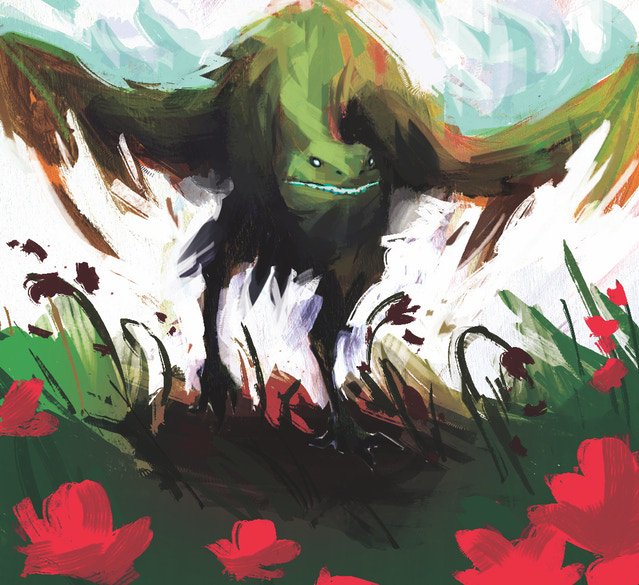
Beyond The Page’s Edge
A review is a funny thing. As a reviewer you do your best to play a game for enough hours that you feel you can give a balanced, fully fleshed-out picture and without missing any major major points. With the exception of video games one can get done alone, or solo board games, this often involves getting a group together for multiple sessions, arranging a time and place to play regularly, and then spending the necessary hours writing and editing a piece until it’s polished enough (or you’re sick of obsessing over edits enough) that you can hit that publish button. You fire, and you hope that your shot hits the mark you’re aiming for.
Life goes on, and if you’ve loved the thing you’ve spent so much time with, you continue to play it well after your obligation ends. Overlight was no different in that respect from any of the top-notch games I’d written about. I still had some sessions left to run for my players in order to round out the story arc I’d written as much for our collective enjoyment as for review purposes; I also had several others asking at our local game night when they could make their own characters and join a drop-in/drop-out friendly format I was planning to continue after my dedicated group finished. Overlight was overwhelmingly well received in our local gaming community by RPG vets and newbies alike, and to help sate my excitement between weekly sessions, I looked online everywhere I could for forums and discussions I could join. I couldn't wait to see what the community at large had created in this world.
Not that there were many such online conversations. Overlight is only roughly a year old, and it doesn’t have many online community spaces yet. But I found them, just like I always find where the gamers are. Which is where this story takes its first turn.
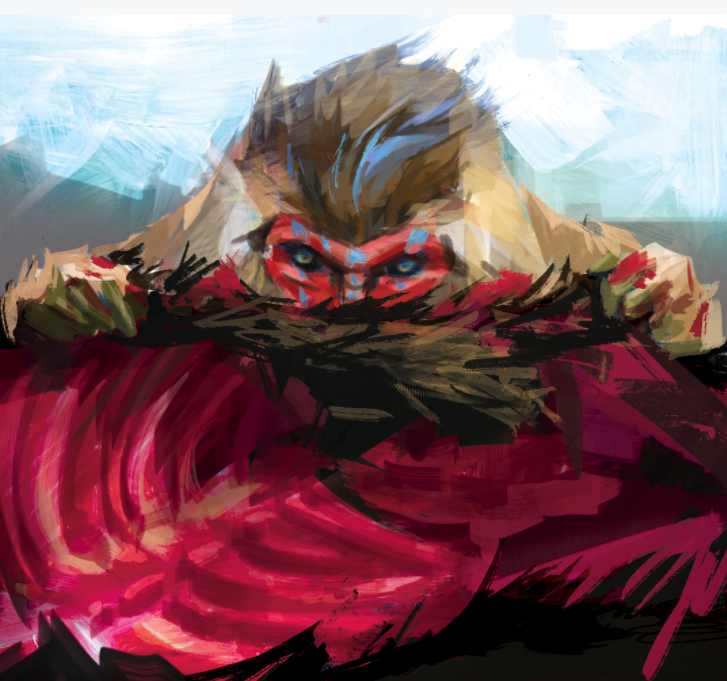
A Call For Community And Confusion Over Criticism
Imagine being as enthusiastic and happy, just looking for friendly voices to have a friendly conversation with about a thing we commonly love... on the internet. You can already see where I may have made a lapse in judgement. Though I should say no one was flat out rude or mean in the ensuing discussion; always comments were framed respectfully, several with very thoughtful words given as to why Overlight didn’t stand up as being all that great for them. I’m the type of person that, knowing it’s wrong, still finds it very hard to separate criticism of a thing for criticism of my own taste in that thing, as if liking a thing while others didn’t was somehow an affront to me as a person. Again, I’ll state that no one even so much as implied this; it’s a thought I’m aware exists completely in my own head and that I struggle with daily. Yet there I was, looking to spread more love about Overlight and receiving instead a slew of comments as to why the system had missed the mark with so many.
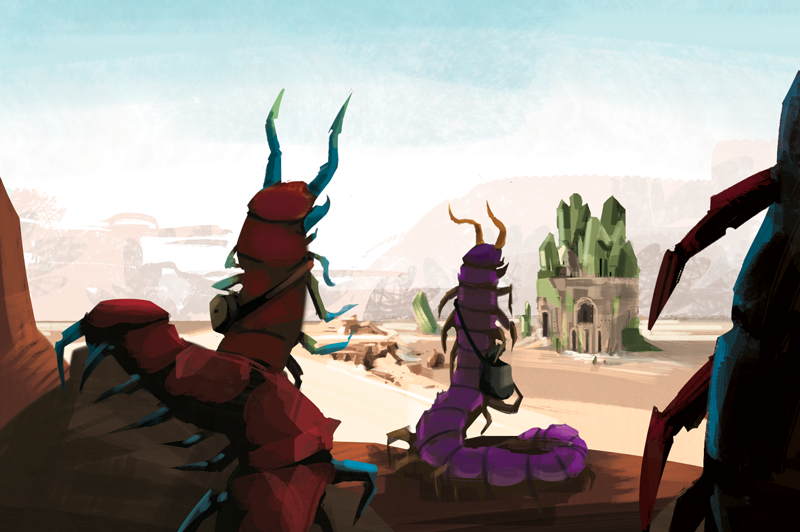
The more I read, the more I let my own insecurities go for an acceptance of what many perceived as shortcomings of the Overlight core book. Anecdotal experience has never been the best indicator of overall success, and I’m full well aware that online forum communities represent a small slice of the gamer population, more settled in their opinions and vocal about them as well. I’m also aware I have no solid numbers on actual Overlight sales, so the opinions I was reading were exactly that. Opinions. But there was certainly a nagging feeling at the back of my mind about where I’d found my extra copy of the core book that I’d purchased for myself: in the discount section of my local game store. It was being unloaded for more shelf space, having sat unmoved for too long. The online opinions mostly converged around similar points and, insofar as they were similar, seemed to have some small merit. Trace enough single lines in the same direction and eventually you see a pattern emerge. The book, especially to a GM running Overlight during a 1-shot game store event, inadequately prepared its audience in that most critical of aspects needed to sell the system: bringing across a sense of its rich lore.
At least, that’s what it’d done for those present, voicing their opinions on not connecting with the system. Why did it seem to fall short for so many and yet not fail me? I kept asking.
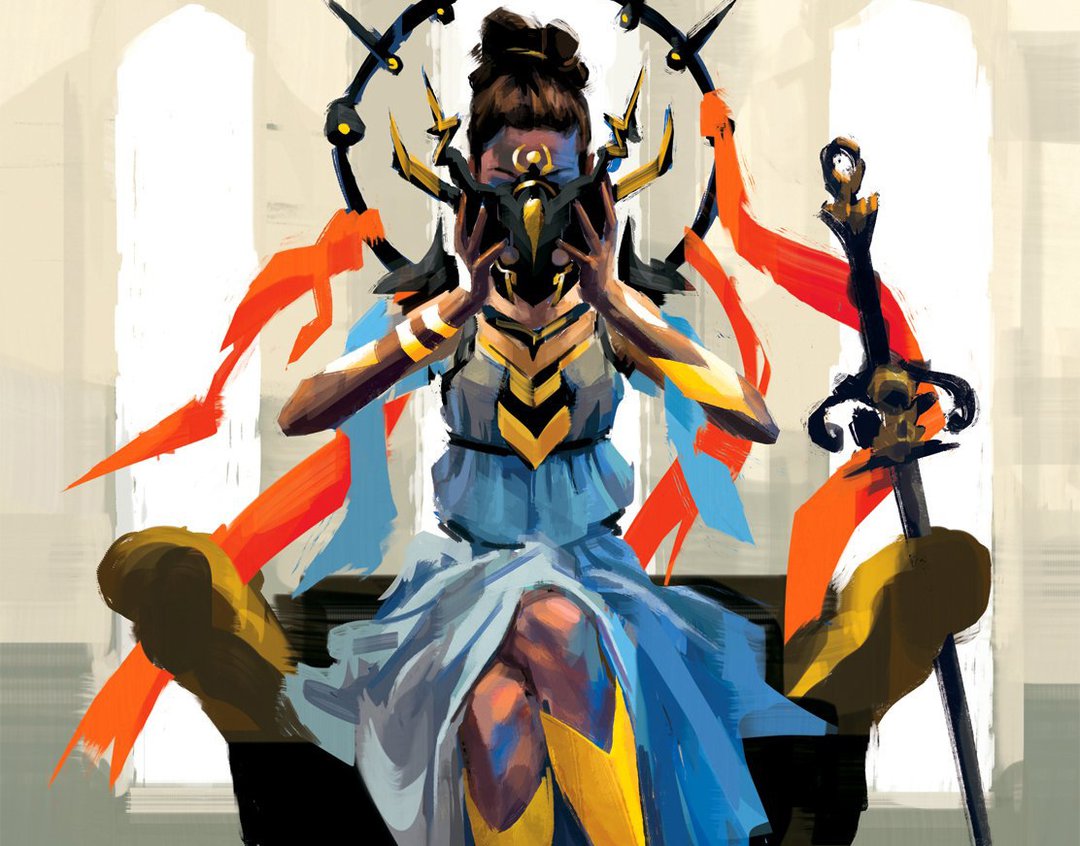
When Self-Doubt Creeps In
Ironically, a fellow English teacher’s comment was the capstone to my time seeking online discussion for Overlight (at least for the time being). Coincidence or fate, you decide, but it was the perfect ending to help me realize where my own disconnect was. I’ve had, as I like to joke, way too much schooling on the subject of the English language, and I also identify as a writer. I’m a bit more practiced, generally speaking, in picking out key words quickly and analyzing important one-liners. My default reading style probes for meanings, implications, and reading Overlight was no different. Also, and this is critical, I read the entire book cover to cover like a novel before I began writing and running my sessions. That’s not something I would expect a store employee running a 1-shot to have done.
What does all this mean? In short, I believe it summarizes a level of dedication that the core Overlight book may demand simply by the way it’s formatted, and for those that don’t put in the needed hours of prep it’s easy to fall short and not “see the light.” The lore, so central to bringing this unique world and its mechanics to life, is split out all across the book. It’s in the shard culture primer at the start. It’s mixed into the Chroma descriptions. It’s spread out through the race backgrounds. And again, some of it is as subtle as a one-liner or suggestive turn of phrase. Are you really going to remember it after 300+ pages of reading? Because if, like me, you want the best picture of things you’re going to need to read the whole book to put all that lore together, and you’re probably still going to spot check and skim back over things to refresh yourself. I still do this for shard lore before each of my weekly game night sessions, but don’t GMs/DMs review notes and book material before sessions all the time?
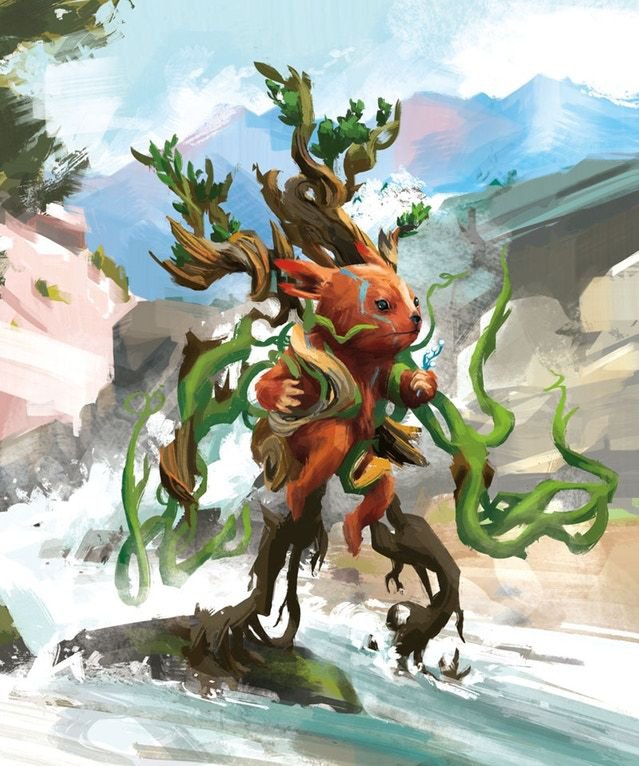
Is it possible I’m still wrong about all of this? Absolutely. I could see a group that’s easygoing just jumping in and using lore they “missed” the first time being added as extra depth on later sessions. The sense I got online, though, was that many wanted to have a clearer picture of what was going on right from the start. Especially in one-shot or demo games, that lack of overall ability to quickly prep key points hurt players’ views toward fitting into the setting, and once they’d turned their attention from Overlight, once that inertia of an object at rest wanting to stay at rest set in, it became very hard to sway opinions; coupled with the light mechanics, the lack of satisfying crunch many of the gaming veterans love when making builds, it seemed there was no redemption for Overlight, at least with this crowd. Were they wrong? By their perspective they seemed to have a point. Was I really just in some kind of minority of players who “got Overlight?” Was it really not, as I had said in my review, for everyone?
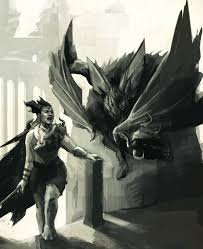
Reflecting On What Matters
I was crushed. It took several days to pull myself out of the rut I’d more or less put myself in. Why should I care so much what others think? The internet is known for its strong opinions, and the kinds of folks who hang around in online forums tend to be particular. Just because they seemed overwhelmingly of one mind didn’t mean it was universally so. Still, I couldn’t shake the feeling that maybe I was the one with the skewed perception. People said the system wasn’t a real system, and they began reaching for the crunch builds and mechanics they loved. In the absence of grounding in the narratively-focused Overlight, they grasped at mechanics, and when that simply designed system “failed” them they turned away for good.
This also transpired during a very odd intersection of events at our local game night venue. There was a last minute closure, and my weekly session of GMing for Overlight, an event that might’ve restored some of my faith in my love for the system, was cancelled. In all fairness, I was already in a bad mood, wanting to get away before I let it show, and I opted to go home rather than relocate to an emergency venue that those present decided to move to. I assumed (wrongly) that my regular players wouldn’t find the new venue. Turns out all my regular players still found their way to it and ended up playing some board games instead. I gave them an apology for ditching when I saw them a week later.
We’re all human. Those responses I’d read were simply responding to an asked-for dialogue. I should have taken them for what they were. Opinions. After all, in my corner of planet Earth we still enjoyed Overlight. Instead I set off to do more research. I found info showing that spaces in which non-D&D RPGs are played are even more niche than the board gaming world, at least as far as DriveThruRPG’s top 100 or Roll20’s Orr Group Industry Report are concerned (both of course utilizing data from their respective sources). I also tossed a poll up on Twitter, recognizing both that the crowd of followers likely to see it was a different sort from the online forums and also that a couple dozen responses does not make for a great sample size in itself. Still, it was that second opinion I was counting on. And then the waiting began.

In the end, when I think about the people I run Overlight for, I remember only their smiles and the way they really get into playing their characters. After each session leading up to my review I asked for feedback, and what I got was that everyone was having the best of times playing together in this system. The world be darned, if we all enjoyed it, what did it matter what anyone else thought? What did it matter if the book was in a sale bin when I bought it? I keep mentioning that point as if it contains some great insight, but truth is it could have just been a factor of excess stock ordered at the store. I’ve asked myself those questions a lot over this last couple weeks while writing, and yet that looming feeling remains. There’s something that nags at me still, something more.
When the Twitter poll concluded, it reinforced my original views: while some people saw dice mechanics as “the point” of a session, the majority saw mechanics as a means to advance story. Story first, dice results to determine success or failure second, and narrative following as appropriate. Overlight was again validated as a narrative driven system in my eyes, one set of subjective anecdotal evidence to counter the other. I say that lovingly, now over my emotional rut regarding the state of the game at large. Two sets of opinions showing that views were just as much on one side as another. Dice-centric or narrative-centric, to each their own.
And yet, if this were an article that ended only with discovery regarding opinion, why bother writing it at all? There was still that feeling from deep in my mind, like a child impatiently poking me in the back until I turned around to acknowledge them. Something more was still to be uncovered.
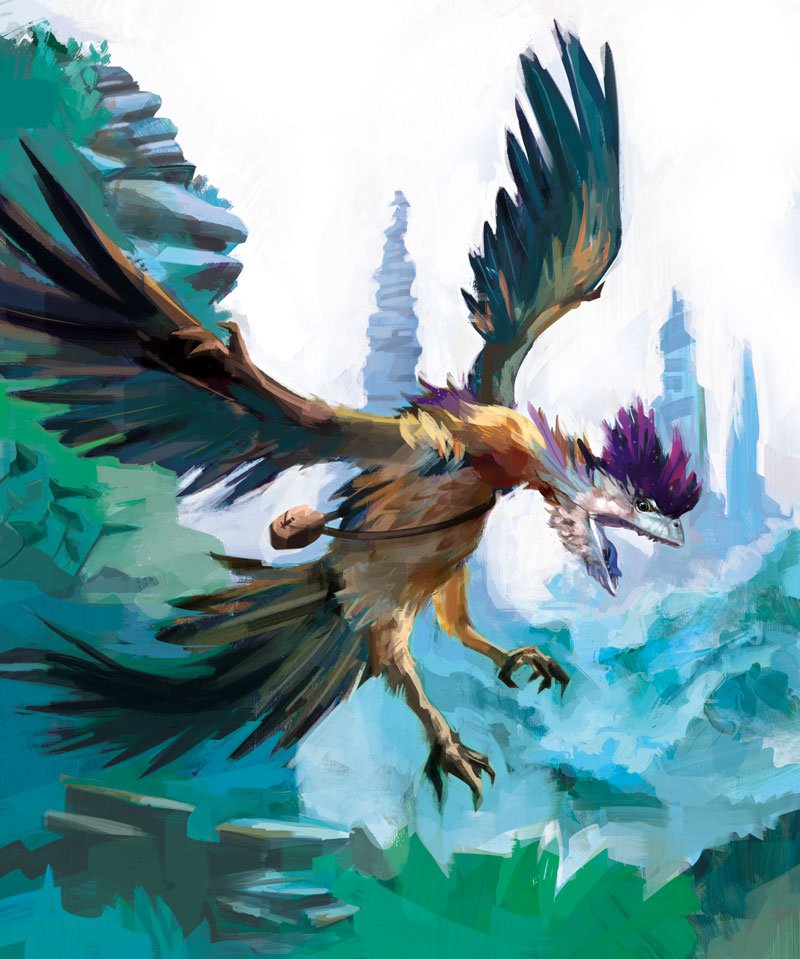
The Destination Illuminates The Journey
I have two big takeaways from this experience following my Overlight review. One is that Overlight is a good system, and I’m not going to be dissuaded again to the contrary. I trust in my original stance, that the game is for everyone, at least the ones who prioritize narrative over dice mechanics, even if the overhead to running a successful game is maybe bigger than I’d made it out to be. The other takeaway is that I’m not satisfied in just seeing this game exist out there in the world. I don’t want it just to be; I want it to thrive.
The truth is, I was still bothered by the circumstances surrounding my own purchase of my copy of the core rulebook; I was afraid of seeing a thing I love cut short before its time. And I don’t disagree with the comments about how the book is formatted either. It’s not easy to work with as a reference mid-game. It requires hours of reading and prep to properly come to terms with (though dedicated DMs often put work like this in with their own campaigns anyway). It wasn’t as 1-shot and new GM friendly as it should have been. And in a world peppered with non-D&D systems to choose from, standing out just on lore is hard. That doesn’t mean what’s inside the book is bad, and I’ve certainly got enough happy faces in my local game nights to back me up on this, but I want more for this system. I want to see continued support and growth with Overlight.
As if on cue while finishing this article, Renegade Game Studios announced a 3-game story module in time for Gen Con, The Ivory Mausoleum, and I’m overjoyed to see it!
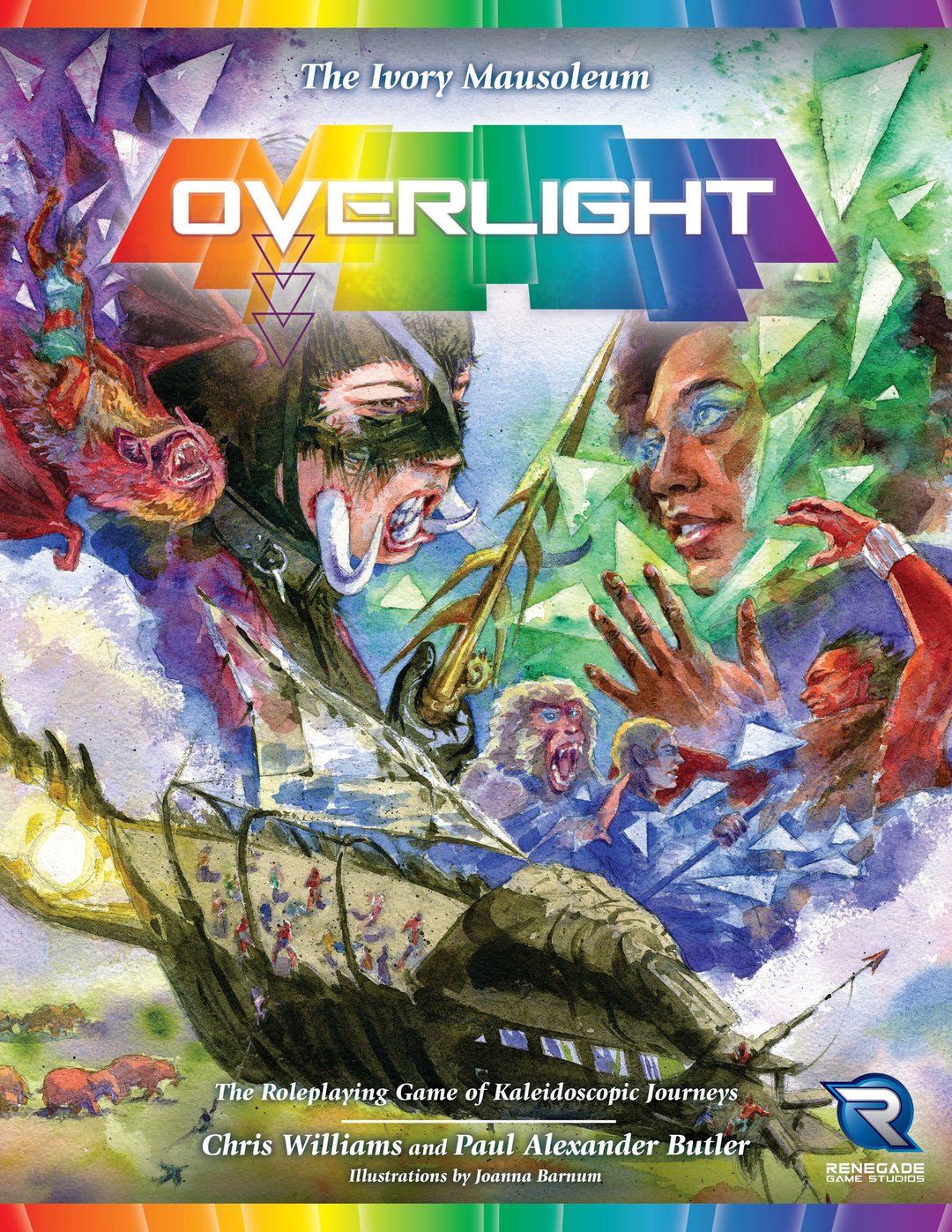
I can't wait to see what this one has in store!
Possible “duh” statement of the week incoming, but I don’t have all the answers. You can spend days on end in meditation on a subject to understand your feelings surrounding it, but that doesn’t necessarily put you any closer to a solution for the larger issues at play. I stand by two statements I made in my review, though. Firstly, I want to see this game release much more supplemental lore material; as if confirmed by my reading of the one previously printed supplement, The Skyborn Order and its Enemies, what was provided was better than anything I was coming up with myself. In the words of Oliver Twist, please sir may I have some more? Secondly, I firmly believe that I do see the potential of this system, obscured as it is scattered across over 300 pages. The shining light is inside this book cover.
Fundamentally, only a second edition printing could fix something as large as centralizing and reorganizing lore of the core book in its entirety, and I can't wait for the day years down the road that this system in its popularity earns that; more immediately, I hope that future story modules released for the game hone that sense of awe I see for the world’s lore, making it accessible to all manner of new players who don’t necessary want to read the core book first. For now I intend to move forwards spreading the word about this still very awesome game. I’m not about to give up talking about it to people at our game night, at cons I cover, and to anyone else that will listen. For other enthusiasts like me who are willing to look past its shortcomings to the potential the system contains, I’m happy to say once again that I think Overlight delivers like no other.
Perhaps what I’ve done in the weeks following my original review has been akin to walking in a very wide circle. Perhaps in a way I’ve gained a little more understanding that will help shepherd new gamers into this system I’ve grown so attached to. I certainly hope so, though one thing seems certain for sure. Life goes on, and for my part I’m hoping I can spread the love of this system to more gamers while continuing to enjoy it myself.